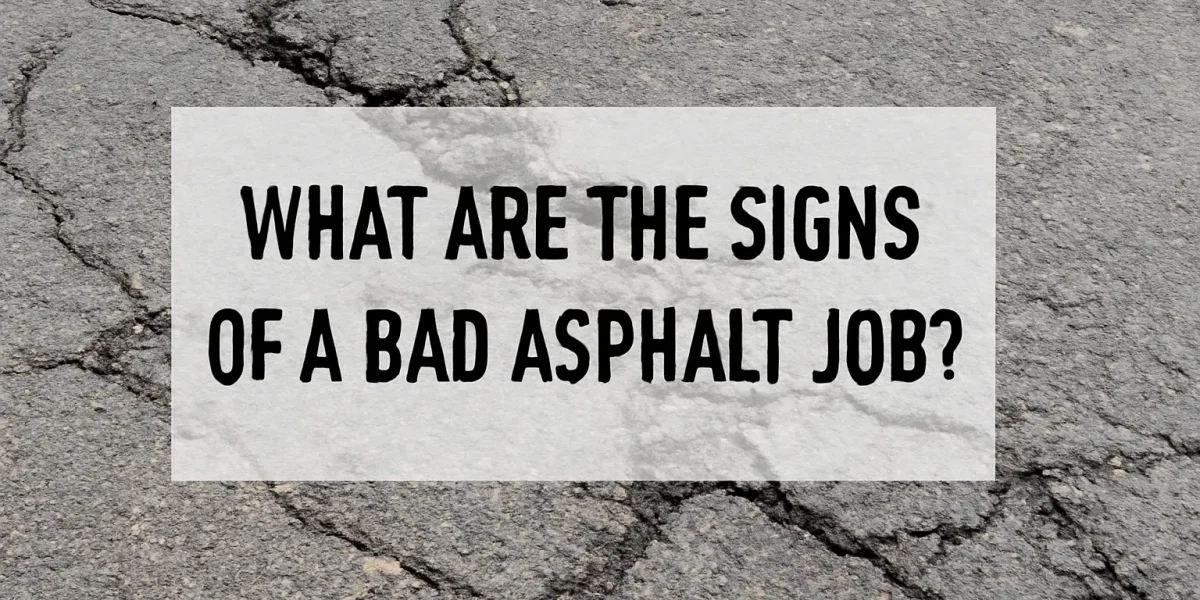When you hire someone to pave your driveway or parking lot, you want it to last a long time, look smooth, and hold up against cars, trucks, and Texas’s tough weather. But if the work is done poorly, small signs like tiny cracks or puddles of water can turn into big problems such as potholes, tripping dangers, and costly repairs. This guide explains what a good asphalt job should include, how to spot poor work, and what steps to take if you think your pavement wasn’t done right. It also shows why picking an experienced local company like Tex Pave Experts is the smartest way to avoid stress and wasted money.
What Is an Asphalt Job?
Paving with asphalt is more than just spreading blacktop on the ground. First, workers check the soil and build a strong base. The base has to be packed tightly so the road can handle cars and trucks without shifting. Experts say the tiny air spaces in the asphalt should be between 3% and 7%. If there are too many (above 8%), water and air can seep in and make the pavement wear out faster. If there are too few (less than 3%), the pavement can become weak and unstable.
The surface also has to be shaped so rainwater runs off instead of sitting in puddles. The Asphalt Institute recommends a slight slope of about 1.5% to 3% so water drains properly and doesn’t cause problems like hydroplaning. Once the surface is ready, the asphalt has to be laid at the right temperature, pressed down with rollers, and smoothed out where it meets curbs and drains.
A good asphalt job uses the right materials, temperatures, base prep, and finishing touches. If any of these steps are skipped or done carelessly, cracks, dips, and broken pavement will appear later.
What are the signs to detect a bad asphalt job?
- Cracks soon after paving Small “alligator” cracks or long lines in a new driveway are not normal. They usually happen when the ground isn’t packed well, the asphalt mix is wrong, or the job wasn’t done correctly. Cracks let water get in. When that water freezes and expands, it makes the cracks worse and weakens the base underneath. Experts warn that paving over wet spots traps moisture. When the mix heats up, that water can turn to steam and cause the asphalt layers to separate. Cracks that appear early are a big warning sign. A good contractor will never pave over puddles and will seal small cracks quickly to keep water out.
- Dips and potholes If you see low spots or dips that hold water, it often means the ground under the pavement wasn’t packed tightly or the gravel base was too thin. These weak spots can later turn into potholes when cars drive over them. A solid base should stop the ground from settling, and the top surface should have a gentle slope of at least 1.5% so water runs off. If your new driveway has puddles or potholes within months, the base prep was likely skipped. The only real fix is to cut out the bad spot, rebuild the base, and repave.
- Standing water Water pooling on asphalt is never just a cosmetic issue, it makes the pavement wear out faster. Experts explain that standing water seeps in, causes hydroplaning, and leads to water damage. New asphalt should always have a slight slope or crown so rain runs to the sides. If water is still sitting there hours after a storm, ask your contractor why. Sometimes the fix is small, like adding a drain, but other times the slope has to be corrected by grinding down and repaving.
- Raveling (loose gravel on the surface) Raveling is when the top layer of the asphalt starts breaking apart and tiny rocks come loose. This happens if the asphalt wasn’t packed tightly, wasn’t hot enough, or if a poor-quality mix was used. As the binder wears out, the surface becomes rough and stones fall away. Sealing the driveway can help slow this, but bad cases need a new layer with the right mix. Raveling also makes oxidation worse, because more pavement is exposed to air and sunlight.
- Colour fading and brittleness New asphalt is dark black and a little flexible. Over time, sun and air make it harder and turn it grey. Some change is normal, but if the colour fades quickly or the surface becomes brittle within months, it means the mix wasn’t protected. Without sealcoating, asphalt loses its flexibility faster and cracks more easily. Experts recommend sealcoating as soon as the pavement starts to look dry and brittle. This seals tiny spaces on the surface and helps stop raveling.
- Rough edges and bad joins A quality asphalt job should blend smoothly into sidewalks, curbs, or other driveways. If the edge ends suddenly, leaves a bump, or creates a lip where it meets other surfaces, it shows poor workmanship. Bad edges not only look sloppy but also let water sneak under the pavement and cause damage. A skilled contractor will slope and pack the edges so the surface looks smooth and safe.
What happens if a bad asphalt job happens?
If asphalt is not built the right way, small issues can quickly grow into big problems:
- Water damage – Cracks and weak spots let water get inside. When the weather changes, the water freezes and melts, which makes the cracks spread and the pavement break apart. If the asphalt mix has too many tiny air holes (over 8%), water can leak through faster and cause damage sooner.
- Safety risks – Low spots that collect water can make cars slide. Potholes can trip people or harm vehicles. Uneven edges near sidewalks can cause accidents or break safety rules. These problems may also lead to injury complaints or insurance issues.
- Shorter lifespan – Good asphalt should last 15-20 years with care. Poorly made asphalt may need big repairs or full replacement after only a few years. Fixing or replacing bad pavement is much more expensive than doing it right the first time.
- Extra repair costs – Constant patching and sealing costs add up. Choosing the cheapest contractor may seem like a bargain, but if they cut corners, you’ll pay more in the long run.
- Lower property value – A cracked driveway or damaged parking lot looks unattractive. It gives visitors or buyers a bad impression and can even lower your property’s value.
If you think your driveway or parking lot was built poorly, contact a trusted paving expert. They can check the pavement’s strength, thickness, and base, then suggest the best way to fix it.
Why To Choose Tex Pave Experts?
If you own a home or business in North Texas, you deserve an asphalt contractor who does the job right and stands behind their work. Here’s why Tex Pave Experts is the best choice when you search for the Best Asphalt Contractor Near Me:
- Complete asphalt and paving services – We take care of everything, from building new driveways to resurfacing and repairs. We check the soil, design a strong base, use high‑quality asphalt, and make sure the pavement is packed tightly so it lasts for many years.
- Local knowledge of North Texas – With over 35 years of experience, we know the local soil, weather, and traffic needs in Dallas-Fort Worth and nearby towns. Our team builds pavement that can handle heavy rain and hot Texas summers.
- Projects of all sizes – No matter if it’s a small home driveway, a country road, or a huge parking lot, we have the crew and equipment to get it done. We make sure every job has the right slope, drainage, and smooth finish.
- Focus on quality and durability – We never cut corners. Our crews follow best practices like avoiding paving over puddles, keeping air spaces at the right level, and making sure the slope is correct. By using the right methods and materials, we build pavement that stays strong and looks good for decades.
- Clear and honest communication – At Tex Pave Experts, we listen to your goals, explain your choices, and give you detailed proposals. We treat your property with care, because your satisfaction is what matters most.
Frequently Asked Questions
How long should a properly installed asphalt driveway last?
If it’s built well, with a solid base and regular care, an asphalt driveway can last 15-20 years or more. How long it lasts depends on the weather, how many cars and trucks use it, and if the surface is sealed now and then. Good work at the start is very important, bad compaction or poor drainage will make the driveway fail much sooner.
Can I fix a bad asphalt job without tearing it out?
Some problems can be fixed. Small cracks can be sealed to stop water from getting in. Low spots or potholes can be cut out and patched with fresh asphalt. But if the pavement is breaking down in many places or the base wasn’t built right, the only long-term fix is to tear out and replace that part.
When should I sealcoat my new driveway?
Experts say you usually don’t need to seal a new driveway for 2-5 years, especially if it doesn’t have heavy traffic. If you seal too soon, it can actually harm the surface. The right time to seal is when the driveway starts looking dry, faded, or shows small cracks. A thin coat of sealer helps protect it and keep it strong.
Why is water such a problem for asphalt?
Asphalt bends and flexes, but water weakens it. Puddles let water soak in, which softens the base and causes sinking. In cold areas, freezing and thawing makes cracks worse. Even in warm places like North Texas, standing water makes the surface crumble and fade. That’s why it’s important to build asphalt with the right slope so water runs off and to never pave over wet areas.
How can I choose a trustworthy paving contractor?
Pick someone with many years of local experience, proper licenses and insurance, and a list of recent jobs. Ask how they prepare the base, what equipment they use to pack the asphalt, and how they handle drainage and edges. Good contractors explain their process, give a clear written proposal, and often include a warranty. Reading reviews and getting a few quotes helps you find fair pricing without losing quality.


